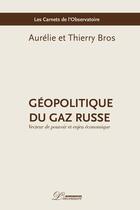-
Date de parution : 20/08/2012
-
Editeur :
Technip
-
EAN : 9782710810162
-
Série :
(-)
-
Support :
Papier
Résumé:
After 20 years at different positions in the gas sector, from the policy side to trading floors, the author gives an overview of the major gas issues and elaborate on the consequences of the US shale gas revolution.
The first part of the book provides basic knowledge and gives needed tools to... Voir plus
After 20 years at different positions in the gas sector, from the policy side to trading floors, the author gives an overview of the major gas issues and elaborate on the consequences of the US shale gas revolution.
The first part of the book provides basic knowledge and gives needed tools to better understand this industry, that often stands, in sandwich, between upstream oil and utilities. After extensive research, publication and teaching, the author shares his insights on fundamental issues all along the gas chain and explains the price mechanisms ranging from oil-indexation to spot.
The second part looks into the future of worldwide gas balance. To supply growing markets, the major resource holder, Russia, is now in direct competition with the major gas producer, the US. China has the potential not only to select the winner but also to decide the pricing principle for all Asian buyers in 2020. As China is a new and growing gas importer and has a lower price tolerance than historical Asian buyers (Japan and South Korea), it is highly possible that, against basic geography, China selects waterborne US LNG vs. close Russian pipe gas, to achieve lower import price. Europe, so risk adverse that it won't be able to take any decision regarding shale gas production on this side of 2020, should see its power fading on the energy scene and would rely more on Russia. Gas geopolitics could tighten Russia stronghold on Europe, on one side, and create a flourishing North America-Asian trade...
This book is accessible to all and will particularly interest readers seeking a global gas perspective where economics and geopolitics mix. It can be read as an economic novel where billions of $ are invested to shape tomorrow energy world or as a geopolitical thriller where Russia and the US compete to impose their respective agenda, leaving China to select the winner...
Donner votre avis















